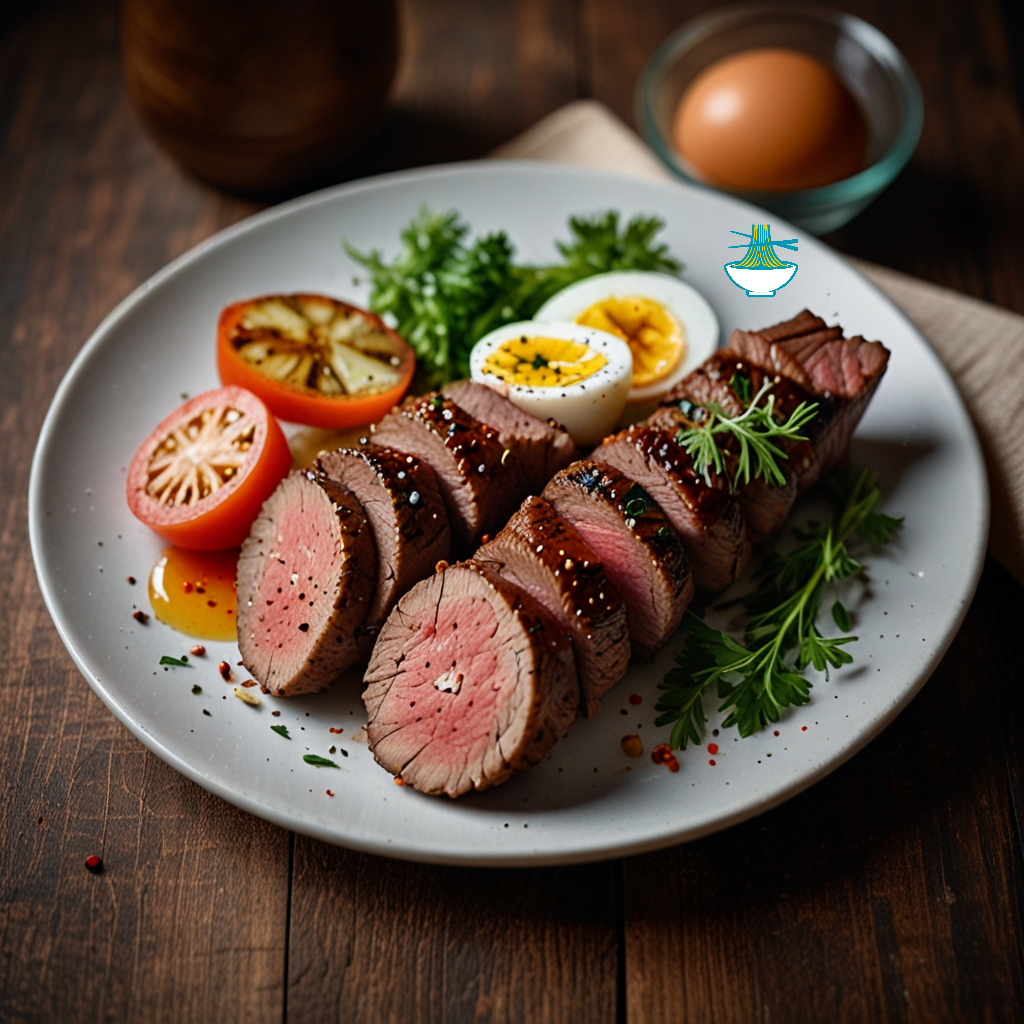Matambre, a traditional Argentine dish, features thinly sliced beef rolled and stuffed with a savory medley of vegetables, hard-boiled eggs, and fragrant herbs. Originating from the gauchos of Argentina, who utilized every part of the cow, this dish showcases their ingenuity and resourcefulness. Matambre is typically cooked on the grill, imparting a smoky flavor while keeping the filling moist and tender. Over time, it has become a beloved staple of Argentine cuisine, celebrated for its delicious taste and cultural significance.
Ingredients:
- 1 lb (450g) flank steak
- 1 carrot, julienned
- 1 red bell pepper, thinly sliced
- 1 green bell pepper, thinly sliced
- 1 onion, thinly sliced
- 2 hard-boiled eggs, sliced
- 2 tablespoons chopped fresh parsley
- Salt and pepper to taste
- Olive oil for brushing
Method:
1. Preheat your grill to medium-high heat.
2. Lay the flank steak flat on a cutting board and season with salt and pepper.
3. Layer the julienned carrots, sliced bell peppers, onion, hard-boiled egg slices, and chopped parsley evenly over the steak.
4. Carefully roll the steak tightly, ensuring the filling stays intact.
5. Secure the roll with kitchen twine or toothpicks.
6. Brush the rolled steak with olive oil to prevent sticking on the grill.
7. Place the roll on the preheated grill and cook for about 15-20 minutes, turning occasionally, until the steak is cooked to your desired doneness and the vegetables are tender.
8. Once cooked, remove from the grill and let it rest for a few minutes before slicing.
9. Slice the matambre into thick rounds and serve hot. Enjoy your delicious grilled matambre!
Nutrition Value:
1. Flank Steak (1 lb / 450g):
- Calories: Approximately 840 kcal
- Carbohydrates: 0 g
- Protein: Approximately 112 g
- Fat: Approximately 40 g
- Sodium: Varies based on preparation, typically around 75 mg
- Cholesterol: Approximately 375 mg
- Vitamins: High in B vitamins, especially B12 and niacin
- Minerals: Rich in iron, zinc, and selenium
- Nutritional Benefits: Excellent source of high-quality protein, iron, and other essential nutrients. Provides energy and supports muscle growth and repair.
2. Carrot (1 medium, julienned):
- Calories: Approximately 25 kcal
- Carbohydrates: Approximately 6 g
- Protein: Approximately 0.5 g
- Fat: Approximately 0 g
- Sodium: Approximately 42 mg
- Cholesterol: 0 mg
- Vitamins: High in vitamin A (beta-carotene), vitamin K, and vitamin C
- Minerals: Contains potassium, manganese, and fiber
- Nutritional Benefits: Supports eye health, boosts immunity, and provides antioxidants that help reduce inflammation and promote overall health.
3. Red Bell Pepper (1 medium, thinly sliced):
- Calories: Approximately 30 kcal
- Carbohydrates: Approximately 7 g
- Protein: Approximately 1 g
- Fat: Approximately 0 g
- Sodium: Approximately 3 mg
- Cholesterol: 0 mg
- Vitamins: High in vitamin C, vitamin A, and vitamin B6
- Minerals: Contains potassium and folate
- Nutritional Benefits: Rich in antioxidants, supports immune function, and may help reduce the risk of chronic diseases like heart disease and cancer.
4. Green Bell Pepper (1 medium, thinly sliced):
- Calories: Approximately 25 kcal
- Carbohydrates: Approximately 6 g
- Protein: Approximately 1 g
- Fat: Approximately 0 g
- Sodium: Approximately 3 mg
- Cholesterol: 0 mg
- Vitamins: High in vitamin C, vitamin A, and vitamin K
- Minerals: Contains potassium and folate
- Nutritional Benefits: Similar to red bell peppers, green bell peppers are low in calories and rich in antioxidants, supporting overall health and wellbeing.
5. Onion (1 medium, thinly sliced):
- Calories: Approximately 45 kcal
- Carbohydrates: Approximately 11 g
- Protein: Approximately 1 g
- Fat: Approximately 0 g
- Sodium: Approximately 3 mg
- Cholesterol: 0 mg
- Vitamins: Contains vitamin C, vitamin B6, and folate
- Minerals: Rich in potassium and manganese
- Nutritional Benefits: Provides antioxidants, anti-inflammatory compounds, and may have various health benefits, including improved heart health and blood sugar control.
6. Hard-Boiled Eggs (2 large, sliced):
- Calories: Approximately 140 kcal
- Carbohydrates: Approximately 1 g
- Protein: Approximately 12 g
- Fat: Approximately 10 g
- Sodium: Approximately 140 mg
- Cholesterol: Approximately 370 mg
- Vitamins: High in vitamin D, vitamin B12, and vitamin A
- Minerals: Contains selenium, phosphorus, and riboflavin
- Nutritional Benefits: Excellent source of protein and essential nutrients, including choline, which supports brain health and metabolism.
7. Fresh Parsley (2 tablespoons, chopped):
- Calories: Approximately 2 kcal
- Carbohydrates: Approximately 0.3 g
- Protein: Approximately 0.2 g
- Fat: Approximately 0.1 g
- Sodium: Approximately 3 mg
- Cholesterol: 0 mg
- Vitamins: High in vitamin K, vitamin C, and vitamin A
- Minerals: Contains potassium and folate
- Nutritional Benefits: Provides antioxidants, vitamins, and minerals, supporting overall health and wellbeing.
8. Salt and Pepper (to taste):
- Nutritional values vary based on quantity used. Salt is a source of sodium, essential for fluid balance and nerve function. Pepper adds flavor and contains small amounts of vitamins and minerals.
9. Olive Oil (for brushing):
- Calories: Approximately 120 kcal per tablespoon
- Carbohydrates: 0 g
- Protein: 0 g
- Fat: Approximately 14 g (mostly monounsaturated fat)
- Sodium: 0 mg
- Cholesterol: 0 mg
- Vitamins: Contains vitamin E and vitamin K
- Minerals: Contains small amounts of iron and calcium
- Nutritional Benefits: Rich in healthy fats, especially monounsaturated fats, which are beneficial for heart health. Also provides antioxidants and anti-inflammatory compounds.


Comments